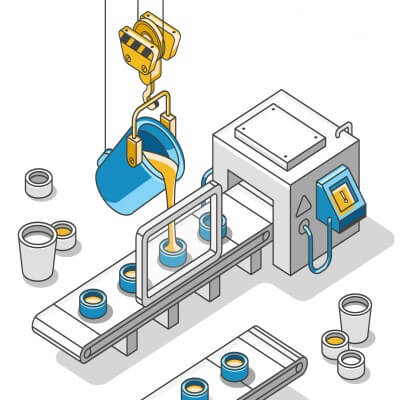

We may often wonder about the way metal smiths unite various precious metals to other materials. This is done through a process known as precious metals plating for making the metal adhere to an underlying object, i.e, a substrate. This Metal Plating is a complex process requiring the immersion of the substrate into a special chemical solution that contains dissolved ions of the precious metal and then passing an electric current into the solution for depositing the metal ions onto the surface of the substrate.
Precious metals are chemical elements that occur naturally and are known for their rarity, high economic value and lustrous appearance. They are non-reactive compared to base metals, which are common and have lesser economic value. Hence, they do not oxidize nearly as quickly and are relatively malleable.
Precious metals are generally used for minting bullion coins and manufacturing fine jewelry but have multiple other industrial uses as well. Gold, silver, and platinum are the most widely recognized ones. The platinum family also includes:
The important registrations and certificates required to set up the factory for precious plating are as follows-
A business owner must first establish a business entity as per his resources, goals, and requirements which can be any of the following:
For more details, click Business Registration
For Jharkhand Pollution Control Board Certificate, click HERE
Consent to Establish (CTE)
For Pollution Control Board Certificate in Telangana, click HERE
The procedure of determination of the category of subject matters of the businesses –
The determination process is typically based on scores. For measuring air pollution marks will be obtained by recognizing various air pollutants and scoring accordingly out of total marks of 40 and for water pollution such scoring will be similarly out of total marks of 40 and the remaining 20 marks out of 100 is allotted for measuring hazardous waste.
If this score of business activity is higher than 60 then it is called a red category of business activity and so on.
How to apply for Pollution Control Certificate
The simple steps can be followed to understand the procedure of applying for a Pollution Control Certificate:
i) The initial application is available on the online portal of any Pollution Control Board or Pollution Control Committee.
ii) The applicant is required to submit the documents and submit Government fees for such applications. The fees for Consent to Establish (CTE) and Consent to Operate (CTO) under Air and Water Act largely depends on certain factors such as the type of business activity, commencement of such business, capital investment of the business, and the duration of Consent to Operate (CTO) validity.
iii) The required documents relating to the details of the industry has to be scanned and uploaded while filling the online application and, in some cases, the physical copy of such application along with those scanned documents and receipt of the fees paid has to be sent by post to the Pollution Board Office or Pollution Committee office.
The status of a pending application for Consent to Establish (CTE) or Consent to Operate (CTO) can be checked on the same online portal of SPCB or PCC.
For more details, click HERE
Consent to Operate
The industries categorized under red, orange, and green categories need to apply for consent to establish and consent to operate under the Air and Water Acts. The consent to operate/renewal shall be granted for 5 years for the precious metal plating industry as it comes under the orange category. The CTO validity for precious metal plating could be for one year per renewal application as this is a red category business activity.
For more details, click HERE
Hazardous Waste Management Authorization
Some of the Precious metal plating activities fall under the red category and require the Hazardous Waste Management Authorization and some of these activities also need emission control equipment.
Plastic Waste Management (PWM) Registration
The precious metal plating process does not use any type of plastics but in case a business entity is engaged in wrapping or packaging the finished products in plastic sheets or packages may require Plastic Waste Management Authorization as a bulk consumer. Registration for Plastic waste can be through CPCB under the Plastic Waste Management (PWM) Rules 2016 and an online portal has been launched in this regard. Producers, importers & Brand-owners are required to fulfill Extended Producers Responsibility (EPR) for the plastic waste generated due to the products introduced by them in the market.
The Trademark certificate can be acquired for which an application has to be made through the online portal of the Trademarks & Patents Office and such trademark must be distinct and innovative. Depending on the distinctiveness, the Registrar might approve and provide the certificate of registration of a trademark. Every 10 years you will have to renew the trademark of your firm.
The Factory License is a certification that a particular factory complies with the Municipal Laws and Labor Laws of a particular Municipal Area or a Gram Panchayat. For acquiring the factory license, one has to make an application to the Office of the Directorate of Factories. The Factory License is issued for one year and it generally requires renewal after every 31st March of the Financial Year.





We are the pioneers in offering environmental consulting services to our patrons, giving us the first mover advantage & keeping us ahead of our competitors.
Very experienced in filing, monitoring & submission of CDSCO Compliances, Drugs Manufacturing & sale guidelines, Environmental Impact Assessment, AERB consulting services, Pollution Control Board CTE & CTO Advisory Services, Waste Management Authorization from State Pollution Control Boards, Fertilizers & Insecticides Manufacturing, Wholesale & Import Compliances
